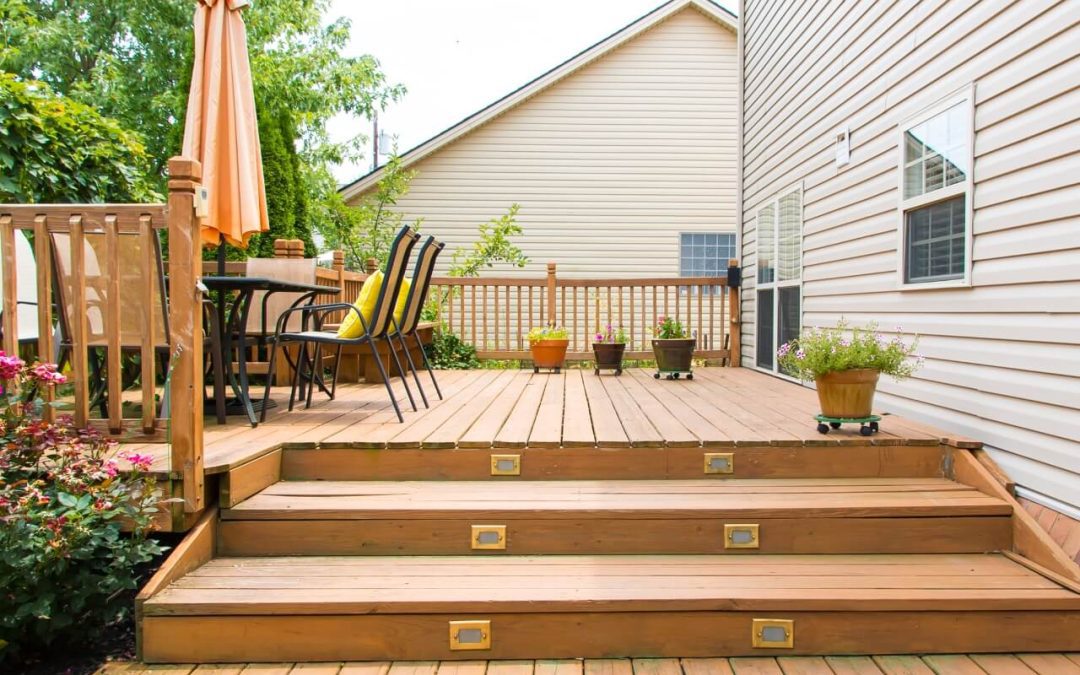A well-designed deck enhances the beauty and functionality of your outdoor living space, providing a versatile area for relaxation, entertainment, and family gatherings. Selecting the right decking material is an important decision when planning your deck. By understanding the characteristics of different materials and assessing your specific needs and preferences, you can make an informed decision that will ensure years of enjoyment and satisfaction.
Popular Decking Materials for Homeowners
Wooden Decking Materials
Wood remains a classic and popular choice for decking material, prized for its natural beauty, warmth, and timeless appeal. Pressure-treated pine is a cost-effective option that offers durability and resistance to rot and insect damage.
Cedar is known for its natural resistance to decay and insects, making it an excellent choice for homeowners seeking a low-maintenance decking solution with rustic charm.
Alternatively, tropical hardwoods like ipe and teak are valued for their exceptional durability and resistance to moisture, rot, and insects, albeit at a higher cost.
Composite Decking
Composite decking offers a compelling alternative for homeowners seeking the warmth and authenticity of wood without the maintenance requirements. Composed of a blend of wood fibers and recycled plastic, composite decking combines the natural look and feel of wood with the durability and low-maintenance benefits of plastic. Unlike wood, composite materials are resistant to rot, decay, and insect infestation. It requires minimal upkeep, only occasional cleaning with soap and water. With a wide range of colors, textures, and finishes, composite decking allows homeowners to achieve their desired aesthetic without sacrificing performance.
PVC
Another popular decking material gaining traction is PVC (polyvinyl chloride) decking. PVC decking is made entirely of synthetic materials and offers unparalleled durability, moisture resistance, mold, mildew resistance, and minimal maintenance requirements. Unlike wood and composite decking, PVC decking is impervious to moisture, making it an ideal choice for areas with high humidity or frequent exposure to water, such as poolside decks or waterfront properties. Additionally, PVC decking is available in a variety of colors and styles, including realistic wood grain textures, allowing homeowners to customize the outdoor space to suit their tastes and preferences.
Alternative Decking Materials
While wood, composite, and PVC decking are the most common options, homeowners may consider alternative materials such as aluminum or bamboo decking. Aluminum decking is prized for its lightweight, corrosion-resistant properties, making it an excellent choice for coastal or marine environments. On the other hand, bamboo offers a sustainable and eco-friendly alternative to traditional wood decking, boasting durability, moisture resistance, and natural beauty.
Choosing Decking for Your Property
To select the right decking material for your home, consider factors such as durability, maintenance requirements, cost, aesthetics, and environmental impact. By weighing these factors and consulting with a reputable decking contractor or supplier, you can make an informed decision that aligns with your budget, lifestyle, and design preferences.
The material of your deck impacts your outdoor living area’s appearance, performance, and longevity. By researching your options, assessing your priorities, and consulting with industry professionals, you will create a stunning and functional outdoor space you and your family will enjoy for years.
FAQs
How can homeowners determine the best decking material for their specific climate?
When choosing materials, it is important to consider climate and environmental factors. For instance, in regions with high humidity or frequent rainfall, materials with superior moisture resistance, such as PVC or composite decking, may be preferable to traditional wood options.
How can homeowners ensure the safety of their deck, including factors like slip resistance and fire resistance?
When choosing decking materials, prioritize safety features, especially for structures near pools or wildfire-prone areas. Many decking manufacturers offer products that meet safety standards and regulations, so research and choose materials accordingly.
Are there any cost-saving strategies homeowners can employ when selecting decking?
Yes. Save money by opting for low-maintenance materials with longer lifespans, reducing the need for frequent replacements or repairs. Additionally, purchasing decking materials in bulk or during off-seasons may yield discounts or promotional offers from suppliers.
How important is proper installation in ensuring the longevity and performance of a deck?
Proper installation is essential to maximize the longevity of decking materials. Improper installation can lead to warping, cracking, and structural instability, compromising the safety and durability of the structure. Hire experienced professionals or follow manufacturer guidelines for installation for the best results.
Are there considerations for homeowners living in coastal areas or regions with harsh weather conditions?
Yes, homeowners in coastal areas should prioritize decking materials with enhanced resistance to corrosion, moisture, and UV exposure. Materials like aluminum or PVC decking may be particularly well-suited for these environments due to their durability and low maintenance requirements.
Inspection Services of Wisconsin provides inspection services for homebuyers and sellers in Northeast and South Central Wisconsin. Contact us to schedule an appointment.

